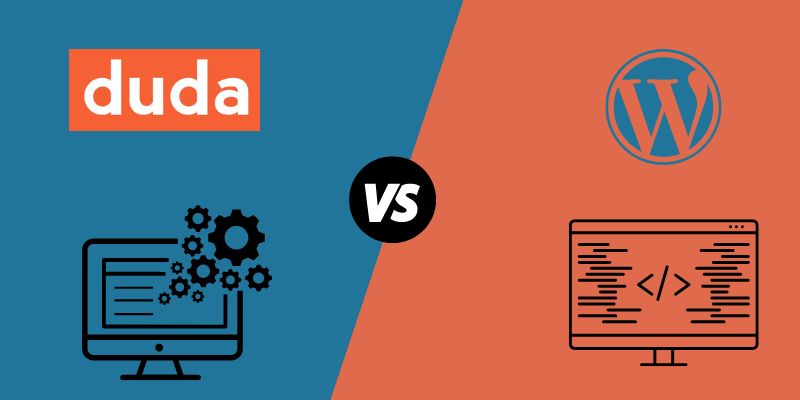
Duda vs WordPress: Which CMS Is Better?
These days, there are several notable Content Management System (CMS) structures to be had. Having said that, there are also many extremely good website developers available. We’ll examine WordPress vs Duda today to see which one would be best for you.
Though their functionalities and page creation approaches are extremely similar, Duda and WordPress are two totally distinct systems.
Which one fits you the best? That, however, will be contingent upon other factors. These characteristics could include setup, price, usability, comfort of use, and other peripheral elements.
You must first draw close to what a content control device (CMS) is, in addition to the distinctions between an open-supply machine and a website builder, to select which one fits your desires.
A CMS: What is it?

You must first grasp what a Content Management System (CMS) is to understand what Duda and WordPress are. In a nutshell, a content material control gadget (CMS) is a chunk of software that allows users to create and hold websites without requiring them to understand a way to code.
Both WordPress and the Duda CMS platform may be used for this.
With a distinctly consumer-friendly interface, a content control device (CMS) permits builders and users to create, assemble, design, manipulate, modify, and put up cloth. They are primarily based on a set of plugins and templates that you could customize and add to as wished.
Now, there are numerous parallels between WordPress and Duda. But they may also be particularly awesome from one another. Although people may know both as content management systems (CMS), they call one an “open-source platform” and the other a “website builder.”
Let’s examine the key differences among these categories of structures.
WordPress is Open Source.
Using an open-source system or platform has the primary benefit of allowing anybody to contribute to the project’s development. This explains some of WordPress’s rise to prominence and popularity.
To put it another way, developers may add more features to a project by creating themes, plugins, and other tools that attach to the system if it is open-source.
This offers an immeasurable platform in terms of functionality. Stated differently, it creates opportunities for growth while reducing the expense of employing experts.
The fact that WordPress allows you to host your website anywhere is just another amazing feature. You may download the files and database and migrate your website to whatever hosting platform you choose because the project is open source.
With the majority of website builders, however—more on these later—this is not the case.
WordPress is an open-supply content management gadget, meaning that you have overall managed the arrival and operation of your internet site. You have complete control over how your website seems, may additionally modify any or all the underlying code, and might select the server vicinity.
Duda is an online page creator.
There are no open-source website builders. While they are often simple to use, you are restricted to specific content standards and cannot create and design entirely for free. Put another way, you are limited by the specific website builder’s guidelines and design.
A website builder often employs a drag-and-drop editing method. For those who like a really straightforward experience, it is perfect. Again, though, unless you can complete the task using a template, the capacity to design and create will be absent.
Using a website builder is perfectly acceptable, particularly if you are a novice and want the drag-and-drop feature. Many individuals enjoy the all-in-one solution that website builders provide.
This implies that the website builder of your choice may also handle domain name registration and hosting. Having said that, unless you pay for more alternatives, their functionality is frequently restricted.
A nice illustration of this would be blogging or eCommerce. Although you will have to pay extra to have those choices integrated into your website, they could be accessible. There will be increases in the price of SEO, marketing solutions, and other items.
Although hosting is taken care of, and you don’t have to worry as much about your website, you are unable to scale and grow as much as you can with WordPress.
This is mostly because you are restricted to the features and regulations of the website builder you selected.
Lastly, and maybe most significantly, a website created with a website builder remains on the same domain. It cannot be transferred to another host.
This is so that you can only utilize what you’ve created if you stay put since website builders are proprietary.
WordPress and Duda are Easy to Use
WordPress and Duda are both user-friendly systems. Given that Duda is a content management system, its admin panel resembles WordPress quite a bit. The scale and drag-and-drop method are the primary differences.
You could first be confused if you have never used Duda. This is because once you launch the Duda platform, you will have a good number of choices and possibilities to review.
With Duda, setup and registration are quite simple. Since you are using their platform, all you have to do is create an account and select your preferred monthly plan. Your domain name may be easily pointed to their platform since hosting is already incorporated into the system.
Additionally, WordPress is really simple to use. WordPress is free, so you’ll need to make sure the domain you want is already reserved. In addition, you’ll need a hosting platform to host your website.
Once more, drag-and-drop capability is supported by Duda from the very beginning. The primary drawback is that personalization doesn’t go too far.
WordPress, on the other hand, permits total customization and code modification. Additionally, it offers a drag-and-drop capability similar to that of well-known WordPress page builders.
Duda Benefits and Drawbacks
Duda is an online website builder, as was already said. Together with all the pre-built tools required to develop your own websites and sales pages, it offers a comprehensive hosting solution.
The platform gives an easy-to-use interface, and no technical expertise is needed. Since it’s no longer an open-supply platform, if you decide to quit the platform, you won’t be able to take your created website with you.
If you pay the prices, you can make use of the Duda CMS platform to create eCommerce sites, blogs, and business websites.
Duda is worth a look if you’re searching for something reasonably easy to use that lets you create expert websites without knowing any programming.
Advantages
- There is no need for any kind of installation.
- There is built-in hosting with Duda.
- Simple to keep up and manage
- A drag-and-drop integrated page builder
- Simple branding for your website
- Tool for team cooperation
- Able can be used to create eCommerce, commercial, and blog websites
- Features of client management
- No technical knowledge is required.
Cons
- It’s not freely accessible.
- Certain features and complex adjustments have a learning curve.
- The selection of themes and styles is quite constrained, particularly in comparison to WordPress. It is also significantly more costly to use than WordPress if you need to modify code.
- Your server is not under your command or control.
- It is a subscription-based, paid service.
WordPress Benefits and Drawbacks
Today’s most user-friendly and robust content control machine (CMS) for blogs and websites is WordPress. Originally meant solely for running a blog, this platform has grown to emerge as the sector’s most broadly used internet site builder.
It has far more users than any other platform due to its popularity.
WordPress is best suited for novices who want to advance their website-building abilities. Because WordPress offers nearly unrivaled capability and independence, it is also highly popular among seasoned site developers.
You can create anything with WordPress if you have some advanced knowledge and computer skills. It is a really simple platform to use, with plenty of built-in functionality straight out of the box. It is very easy to administer and install.
I assume this is the place where WordPress shines nicely.
If you are just starting out, you, in all likelihood, have some time to research the fundamentals and prepare an easy website. However, WordPress has a ton of features and options that make it simple to scale, even with its ease of use.
Globally, it is also a preferred option for very large corporations.
Pros
- Positives Very adaptable
- It is possible to construct blogs, portals, applications, and websites.
- Search engines considerably more easily adjust to WordPress websites.
- Simple to learn without any prior understanding of HTML or other code
- Largest online network and support system
- Completely adaptable
- No action is required from website creators or owners for upgrades, which happen automatically.
- Countless free and premium themes, plugins, and other resources
- Owners may administer their website from any computer or mobile device, giving them total control without the need for a web developer.
- Really simple to install
- Great versatility and functionality right out of the box; extremely safe
- There are several users and user roles accessible.
- Outstanding for marketing
Cons
- Updates may come out so often that plugins become outdated.
- Modifying images and creating changes will need some familiarity with CSS and HTML.
- Unless they are manually changed by the user, default URLs are numeric.
- If not correctly optimized, a large amount of content may provide a sluggish experience.
- Prone to plugin infections, which, if updates are irregular, can remove material.
Comparison of Customization
WordPress gives you complete power and nearly infinite customization options. You can very much create, build, and develop anything you want on this open-source platform.
WordPress is also a great platform for blogging, eCommerce, SEO, and marketing.
You may add and remove some basic HTML and CSS elements with Duda. But the extent of what you can alter is constrained.
You may modify Duda’s built-in SEO settings to suit your needs. Once more, though, its offerings will be restricted to you.
Not to mention, Duda has a website with terms and rules. Your website may be removed if it violates any of the terms of this agreement.
Comparison of Security

There is usually a lot of talk about security. Regardless of the form of CMS you’re the usage of, this is accurate. Developers and owners of websites need to recognize if their systems are safe from viruses, malware, and hackers.
By continuously enhancing its core platform and disseminating security best practices to other plugin and theme developers, WordPress has made significant progress in the field of security.
Additional security features and choices are also provided by web hosting companies, which may be used to safeguard a website. Overall, WordPress has very tight functionality and security right out of the box, and most developers feel quite comfortable using it.
Duda is also very careful about website security. They provide a ton of options and tools to maintain the security of your website. They provide malware protection, anti-virus protection, backup and restore capabilities, and access control, among other things, because they also provide hosting.
Regarding the integrity and safety of your website, you should feel comfortable utilizing any of the two secure platforms.
Comparing Costs
In this regard, WordPress clearly dominates the competition.
Indeed, you will need to pay for hosting as well as any additional third-party plugins and themes you choose to utilize. Nevertheless, utilizing WordPress for site development and upkeep will ultimately be far less expensive than using Duda.
This is a result of the subscription pricing system, which we will now examine.
Duda has a $14 monthly starting price and increases from there. They cost $22 and $44, and there is a personalized option that requires a phone call to get. These costs are continuous and monthly.
In comparison, our most affordable WordPress hosting would only cost you $2.49 a month if you paid upfront. This translates as annual savings of at least $138.12!
The add-ons are where Duda really earns the most money and where you will ultimately pay even more. eCommerce, blogging, team members, and other features will ultimately cost you more.
Conclusion
Selecting between WordPress and Duda does not need to be difficult. You must reflect on consideration of your company’s objectives and the fine way to achieve them. Making the best choice after that will be easier.
WordPress is the obvious winner in this case, in my opinion. Although there is some useful functionality available with Duda, WordPress has considerably more capabilities that allow you to achieve far more than Duda can.
Have fun on your journey, and report back to us on your choice.
You can also read our related articles: